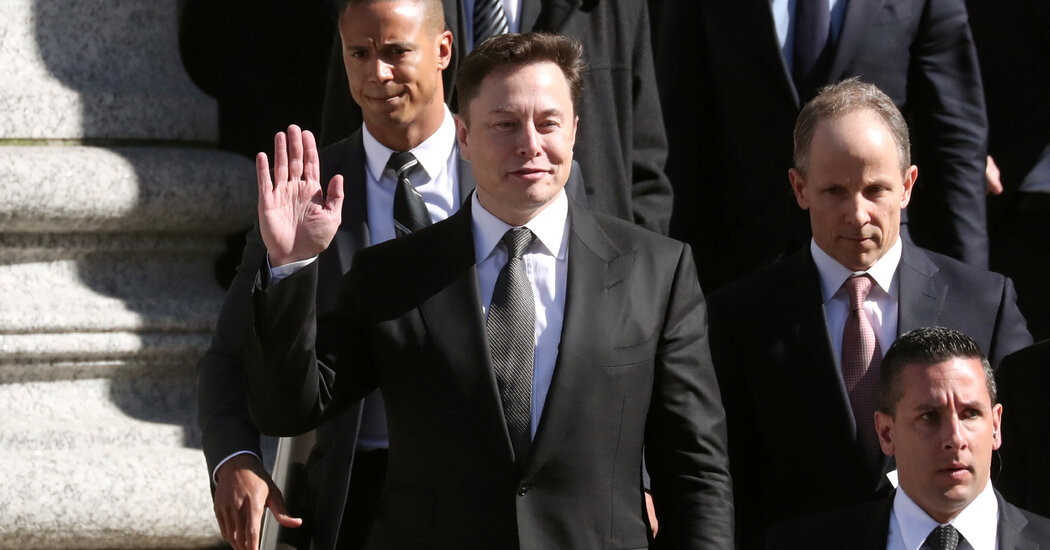Elon Musk accused Twitter on Friday of cheating on him about his service, covering up facts and failing to notify him of leadership changes, in his first formal response to the company’s lawsuit seeking to force him into a takeover. of the $44 billion social media service.
Attorneys for Mr. Musk, who made the blockbuster deal to buy Twitter in April but has since tried to end the purchase, advanced the arguments in a legal filing designed to oppose the company’s claim for a four-day trial in September in the case.
Twitter is rushing to court after “a two-month search for delays, technical bottlenecks, evasive answers and ultimately denials,” Mr. Musk’s lawyers said in the file. They added that Twitter was trying to “hide the truth” about fake accounts on the service, an issue Mr Musk has made central to his desire to get out of the deal.
Twitter had requested a trial in September as Mr. Musk would complete his deal to buy the company by October 24. Musk’s lawyers instead suggested a date for a trial in February, noting that the deal deadline will be automatically extended in the event of a lawsuit. The banks that have pledged to help fund the deal have promised that funding until April 25, 2023.
Mr. Musk’s legal filing was a strong rebuke to Twitter’s allegations that he was falsely trying to end the acquisition. In his lawsuit this week, Twitter said Mr. Musk had “knowingly, intentionally, intentionally and materially” breached his agreement to buy the company by falsely claiming that he was denied information about the prevalence of fake accounts on the service.
Read more about Elon Musk and Twitter
The ensuing legal battle promises to be ugly and lengthy. The back and forth between the two sides had escalated for weeks before it ended up in court. Mr. Musk has made sharp comments about the company and has regularly questioned the prevalence of fake accounts on the platform. Fake accounts are used to spread spam or manipulate Twitter’s service by falsely promoting trends, and are often automated rather than managed by real people.
At one point, Mr. Musk tweeted that the deal with Twitter was on hold. His actions have coincided with a decline in the value of technology stocks, including that of Tesla, the electric car maker Mr. Musk heads and which is the main source of his wealth.
Twitter has maintained that it has worked with Mr. Musk to close the deal and plans to push the sale. In the deal agreement, Twitter and Mr. Musk have included a so-called specific performance clause that allows the company to sue to push through the deal, as long as the debt incurred by the billionaire for the acquisition is in place.
A Twitter spokesperson declined to comment.
Ann Lipton, a corporate governance professor at Tulane Law School, said it was clear why Twitter went so fast and Mr. Musk didn’t.
“The Twitter board has a vested interest in getting this sorted out quickly, and it has a vested interest in procrastinating – time is money,” she said. About Mr. Musk, she added: “He will want to make as many discoveries as possible and free up as much time as possible, essentially the threat of the process itself and, as time goes on, the uncertainty that comes with it. enforce or withdraw settlement.”
In the legal filing, Mr. Musk’s lawyers echoed many of the arguments they made this month when the billionaire said he intended to end the deal.
Twitter has failed to conduct a rigorous count of fake accounts and has hindered Mr Musk’s efforts to understand how spam was counted, the filing said. “Musk was stunned to learn how lean Twitter’s process was,” the filing said, noting that the company was using humans to get the information rather than machine learning.
Mr. Musk tried to get more data from Twitter on fake accounts, the filing added, but the company has “deliberately erected artificial roadblocks and frustrated the defendants’ efforts”.
To determine how Twitter counts fake accounts, Mr. Musk needed months of discovery and dozens of statements, his lawyers said. Mr. Musk has argued that Twitter’s public revelations that fake accounts make up about 5 percent of active users are misleading. Incorrect numbers could be a “material adverse effect” under the terms of the deal and allow Mr. Musk to walk away, his lawyers said, arguing that the numbers “refer directly to Twitter’s potential value to users and advertisers.” ” point.
Twitter has made mistakes with its user numbers before, Mr Musk’s lawyers said. In April, the company said it had overestimated its active users from 2019 to 2021.
The company said in its lawsuit that it had notified Mr. Musk’s attorneys about the two executives and that the attorneys “had not objected.”
Twitter and Mr. Musk are scheduled to hear the matter Tuesday at Chancery Court in Delaware, where the company filed a lawsuit against the billionaire. The court’s chancellor, Kathaleen St. J. McCormick, has been appointed to oversee the case and will decide whether to expedite the case, as Twitter has requested, or delay the case for Mr. Musk.
If the lawsuit goes to trial, Judge McCormick will determine whether Mr. Musk should close the deal. She can also make Mr. Musk walk away while forcing him to pay damages. According to many readings of Twitter’s contract with Mr. Musk, damages would be capped at $1 billion. The two sides can also settle or renegotiate the deal.
Twitter has lost about a third of its value since Mr. Musk signed the deal to buy the company for $54.20 a share. The company will announce its quarterly results next Friday.

